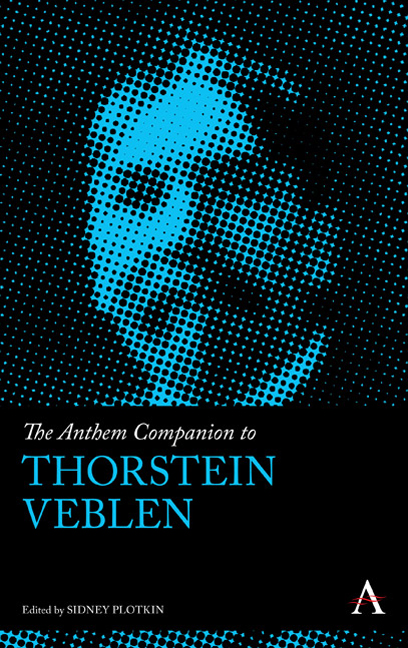Book contents
- Frontmatter
- Dedication
- Contents
- Acknowledgments
- Introduction: Thorstein Veblen's Elusive Project
- Part I METHOD, PHILOSOPHY AND VALUES
- Contents
- Chapter One The Instinct of Workmanship and Other Philosophical Concepts in Thorstein Veblen's Methodology
- Chapter Two Reconsidering Thorstein Veblen's Use of Instincts
- Chapter Three Roman Catholic Critics of Thorstein Veblen and Institutional Economists
- Chapter Four The Metaphysical World of Thorstein Veblen: Of and Beyond the Here and Now
- Chapter Five Veblen's Position on Education Analyzed and Reformulated
- Part II CAPITALISM, SOCIAL STRUCTURE AND POLITICS
- List of Contributors
- Index
Chapter Two - Reconsidering Thorstein Veblen's Use of Instincts
from Contents
Published online by Cambridge University Press: 10 January 2018
- Frontmatter
- Dedication
- Contents
- Acknowledgments
- Introduction: Thorstein Veblen's Elusive Project
- Part I METHOD, PHILOSOPHY AND VALUES
- Contents
- Chapter One The Instinct of Workmanship and Other Philosophical Concepts in Thorstein Veblen's Methodology
- Chapter Two Reconsidering Thorstein Veblen's Use of Instincts
- Chapter Three Roman Catholic Critics of Thorstein Veblen and Institutional Economists
- Chapter Four The Metaphysical World of Thorstein Veblen: Of and Beyond the Here and Now
- Chapter Five Veblen's Position on Education Analyzed and Reformulated
- Part II CAPITALISM, SOCIAL STRUCTURE AND POLITICS
- List of Contributors
- Index
Summary
Thorstein Veblen based his analysis of human behavior on an amalgam of nineteenthcentury instinct psychology. Veblen thoroughly rejected the associationist psychology that was the major alternative psychological framework for explaining human behavior as inadequate (Jennings 1999, 518). Veblen's particular use of the concept of instinct consists of some extremely selective borrowing from instinct scholars who were his contemporaries. Veblen basically argued that instincts provided the motive force for human behavior but the form in which that motive manifested itself in actual behavior was a function of culture and individual experience. Despite both Veblen's instinct eclecticism, or ecumenicalism with regard to differing opinions about instinct, and his prominent statements of skepticism about the concept of instinct itself there is no doubt that Veblen was serious about the importance of instinct. He considered his work on instinct his only important contribution to economic theory (Dorfman 1934, 324).
As Geoffrey Hodgson notes, most of Veblen's followers quickly abandoned instinct psychology as a foundation for their work (2004, 269). In particular C. E. Ayres attacked instinct psychology directly (1921a, 1921b). He also explicitly adopted a very vague behaviorism as the foundation of human behavior. Ayres argued that human activity is a unity of biological and social activity that can be understood at different levels of analysis. The biological aspects of that activity should be understood and explained biologically— a level of analysis presumably left to others. Alternately the social and cultural aspects of activity should be explained in terms of social and cultural processes— this was the level of analysis that Ayres argued institutional economists should devote themselves to, for the explication of human behavior. While a connection between the biological level and social level was presumed, the institutional economists need not concern themselves with it (Ayres 1978, 92– 94). This led Ayres, a generation of his students and a considerable number of followers to concern themselves with explaining cultural behavior in terms of cultural processes without explicitly considering whether the biological elements of human behavior have causal significance for cultural elements of behavior. Elsewhere I have termed this, the “its culture all the way down” approach (Waller 2003). But of course it is “culture all the way down” until it is not.
- Type
- Chapter
- Information
- The Anthem Companion to Thorstein Veblen , pp. 39 - 68Publisher: Anthem PressPrint publication year: 2017

